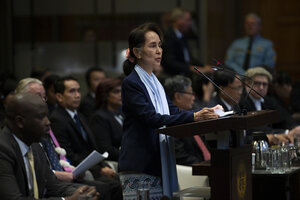A court nudge for redemption in Myanmar
A U.N. tribunal orders Myanmar to protect the Rohingya minority as it weighs a charge of genocide. The decision hints at hope of reform within the country’s military.

Myanmar's civilian leader, Aung San Suu Kyi, addresses the International Court of Justice in The Hague, Netherland, Dec. 11.
AP
Of the many aspects of justice – from truth-telling to retribution to deterrence – perhaps the most difficult is redemption of those guilty. A good example is a decision Thursday by the United Nations’ highest tribunal.
A panel of 17 judges in the International Court of Justice (ICJ) ordered Myanmar to protect the country’s minority Rohingya even while the court continues to weigh whether the military committed “genocidal acts” against the Muslim minority in 2017, during which thousands were killed.
In other words, the ICJ has some faith in the military’s ability to admit its mistakes and refrain from further harm against the 600,000 Rohingya left in Myanmar. The court asked the government to report back within four months.
In their decision, the judges noted Myanmar’s stated attempt to facilitate the return of Rohingya refugees in Bangladesh, promote ethnic reconciliation with the group, and hold the military accountable for violations of international human rights law. Indeed, seven soldiers were convicted of killing Rohingya in a military tribunal in 2018, although they received light punishment.
The judges may be trying to balance a swift imposition of universal standards against a patient approach toward Myanmar’s internal struggle to reduce the military’s powers, establish a full civilian democracy, and create a justice system based on a democratic consensus on the country’s moral standards.
The ICJ could yet decide that Myanmar did commit genocidal acts. It would then ask the U.N. Security Council to consider punishing the country, although that is doubtful. China or Russia might veto such a step. In the meantime, the court can only nudge Myanmar to speed up its attempts at reform.
In an opinion piece in The Financial Times this week, Aung San Suu Kyi, who effectively runs the civilian – and weaker – side of the government, asked the international community to give Myanmar a chance to discuss “accountability for human rights violations that occurred” and develop “a road map for change.” An official government inquiry has found that members of the military had committed war crimes against the Rohingya. But the panel could not prove genocide.
The Nobel laureate said foreign pressure is undermining the “painstaking domestic efforts to establish co-operation between the military and the civilian government.”
Myanmar’s military has reigned over the country for nearly 60 years. It perceives itself – not Ms. Aung San Suu Kyi, daughter of the nation’s founder – as the protector of the Burmese people. It has made small steps so far to hold itself accountable for atrocities against minorities. Those steps are being forced both by domestic demands and by foreign entities such as U.N. tribunals. Redemption may come hard for Myanmar’s army. The ICJ decision is showing a path forward. It will be up to the military to walk in it.

